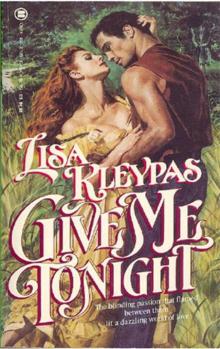- Home
- Lisa Kleypas
Love in the Afternoon Page 9
Love in the Afternoon Read online
Page 9
“Poor man,” Amelia murmured, thinking of Phelan’s haunting eyes. “I didn’t recognize him at first. I wonder if he knows how much he has changed?”
Cam’s lips played lightly at her temple as he replied. “I suspect he is realizing it now that he’s home.”
“He was very charming before. Now he seems so austere. And the way he stares sometimes, as if he’s looking right through one . . .”
“He’s spent two years burying his friends,” Cam replied quietly. “And he’s taken part in the kind of close combat that makes a man as hard as nails.” He paused reflectively. “Some of it you can’t leave behind. The faces of the men you kill stay with you forever.”
Knowing that he was remembering a particular episode of his own past, Amelia turned and hugged herself close to him.
“The Rom don’t believe in war,” Cam said against her hair. “Conflict, arguing, fighting, yes. But not in taking the life of a man with whom one has no personal grievance. Which is one of many reasons why I would not make a good soldier.”
“But for those same reasons, you make a very good husband.”
Cam’s arms tightened around her, and he whispered something in Romany. Although she didn’t understand the words, the rough-soft sound of them caused her nerves to tingle.
Amelia nestled closer. With her cheek against his chest, she reflected aloud, “It’s obvious that Beatrix is fascinated by Captain Phelan.”
“She’s always been drawn to wounded creatures.”
“The wounded ones are often the most dangerous.”
His hand moved in a soothing stroke along her spine. “We’ll keep a close watch on her, monisha.”
Beatrix kept pace easily with Christopher as they headed toward the forest. It nagged at him to have someone else holding Albert’s leash. Beatrix’s assertiveness was like a pebble lodged in the toe of his shoe. And yet when she was near, it was impossible to feel detached from his surroundings. She had a knack of keeping him anchored in the present.
He couldn’t stop watching how her legs and hips moved in those breeches. What was her family thinking, to allow her to dress this way? Even in private it was unacceptable. A humorless smile curved his lips as he reflected that he had at least one thing in common with Beatrix Hathaway—neither of them was in step with the rest of the world.
The difference was that he wanted to be.
It had been so easy for him, before the war. He had always known the right thing to do or say. Now the prospect of reentering polite society seemed rather like playing a game in which he had forgotten the rules.
“Will you sell your army commission soon?” Beatrix asked.
Christopher nodded. “I’m leaving for London in a few days to make the arrangements.”
“Oh.” Beatrix’s tone was noticeably subdued as she said, “I suppose you’ll call on Prudence.”
Christopher made a noncommittal sound. Inside his coat pocket rested the small, tattered note he carried with him always.
I’m not who you think I am . . .
Come back, please come home and find me.
Yes. He would find her, and discover why she had written those haunting words. And then he would marry her.
“Now that your brother is gone,” Beatrix said, “you’ll have to learn how to manage the Riverton estate.”
“Among other things,” he said curtly.
“Riverton encompasses a large part of the forest of Arden.”
“I was aware of that,” Christopher said gently.
She didn’t seem to notice the touch of sarcasm. “Some estate owners are overcutting, to supply the local manufacturing businesses. I hope you won’t do that.”
Christopher remained silent, hoping that would quell further conversation.
“Do you want to inherit Riverton?” Beatrix surprised him by asking.
“It doesn’t matter whether I want it or not. I’m next in line, and I’ll do what is required.”
“But it does matter,” Beatrix said. “That’s why I asked.”
Losing his patience, Christopher said, “The answer is no, I don’t want it. It was always supposed to be for John. I feel like a bloody impostor trying to assume his place.”
With anyone else, the burst of vehemence would have put an end to the questioning. But Beatrix persisted. “What would you have done if he was still alive? You would still sell your commission, wouldn’t you?”
“Yes. I’ve had enough of the army.”
“And then? What would you do?”
“I don’t know.”
“What are your aptitudes? Your talents?”
Their footsteps slowed as they reached the woods. His talents . . . he could hold his liquor, beat a man at billiards or cards, seduce a woman. He was a crack shot and an excellent rider.
Then Christopher thought of the thing in his life he had most been lauded for, and showered with praise and medals.
“I have one talent,” he said, taking Albert’s leash from Beatrix’s hand. He looked down into her round eyes. “I’m good at killing.”
Without another word, he left her standing at the edge of the forest.
Chapter Nine
In the week after Christopher had returned to Hampshire, the discord between him and his mother became so pronounced that they found it difficult to occupy the same room for more than a few minutes at a time. Poor Audrey did her best to serve as peacemaker, without much success.
Mrs. Phelan had fallen into a habit of relentless complaining. She couldn’t go through a room without tossing out nagging comments like a flower girl flinging handfuls of petals at a wedding. Her nerves were acutely sensitive, obliging her to lie quietly in a dark room in the middle of the day, every day. A collection of aches and pains kept her from supervising the household, and as a result, nothing was ever done to her satisfaction.
During Mrs. Phelan’s daily resting period, she reacted to the rattling of plates in the kitchen as if she had been stabbed with invisible knives. The murmur of voices or the thud of feet on the upper floors were agony to her nerves. The entire household had to tread upon eggs for fear of disturbing her.
“I’ve seen men who had just lost arms or legs and complained far less than my mother,” Christopher told Audrey, who had grinned ruefully.
Sobering, Audrey said, “Lately she has become fixed in her mourning rituals . . . almost as if her grieving will keep John with her in some way. I’m glad your uncle is coming for her tomorrow. The pattern of her days needs to be broken.”
At least four mornings a week, Mrs. Phelan went to the family burial plot at the graveyard of the Stony Cross church, and spent an hour at John’s grave. Since she did not want to go unaccompanied, she usually asked Audrey to go with her. However, yesterday Mrs. Phelan had insisted that Christopher escort her. He had waited for an hour in grim-faced silence while she knelt by John’s headstone and let a few tears fall.
After she had finally indicated that she wished to rise, and Christopher had gone to help her to her feet, she had wanted him to kneel and pray as she had.
He hadn’t been able to do it, not even to please her.
“I’ll mourn in my own way,” Christopher had told her. “At a time of my choosing, not yours.”
“It’s not decent,” Mrs. Phelan said heatedly, “this lack of respect for him. Your brother deserves to be mourned, or at least be given a show of it, by the man who has profited so greatly by his death.”
Christopher had stared at her in disbelief. “I have profited?” he had repeated in a low voice. “You know I never gave a damn about inheriting Riverton. I would give everything I have, if it would bring him back. If I could have sacrificed my life to save his, I would have.”
“How I wish that had been possible,” she had said acidly, and they had ridden back to the house in silence.
And all the while, Christopher had wondered how many hours she had sat at John’s grave and wished that one son were in the place of the other.
John had
been the perfect son, responsible and reliable. Christopher, however, had been the wilder, rougher son, sensual and reckless and careless. Like his father, William. Every time William had been caught up in some kind of scandal in London, often involving some other man’s wife, Mrs. Phelan had been cold and distant to Christopher, as if he had been the designated proxy of her unfaithful husband. When William Phelan died as a result of being thrown by a horse, it had been whispered in London that the only surprise was that he had not been shot by some outraged husband or father of one of the women he had debauched.
Christopher had been twelve at the time. In his father’s absence, he had gradually inhabited the role of wild-living rake. It seemed to have been expected of him. The truth was that he had reveled in the pleasures of the city, no matter that such enjoyments were fleeting and hollow. Being an army officer had been the perfect employment for him . . . he had found it enjoyable in every regard. Until, Christopher reflected with a grim, private smile, he’d actually been called to go to war.
Christopher had been far more effective in combat than he or anyone else had ever expected. And the more successful he’d become at bringing death to others, the more dead he had felt inside.
But there was Prudence. That was the only decent part of him left, the part that loved her. The thought of going to her filled him with agitation.
He still found it difficult to sleep, often waking up bolt upright in the middle of a nightmare. And there were moments in the day when he twitched at a sudden noise and found himself fumbling for a rifle that wasn’t there. But he was certain all of that would improve in time.
It had to.
Chapter Ten
Obviously there was no reason to hope for anything, where Christopher Phelan was concerned. Beatrix kept reminding herself of that fact. He wanted Prudence. Beautiful, golden-haired, conventional Prudence.
It was the first time in Beatrix’s life that she had wanted to be someone other than who she really was.
“I think you might be my only chance of becoming part of the world again . . .”
Perhaps Prudence, after all, was best suited to help Christopher. She was at ease with society in a way that Beatrix could never be. Very well. If that was best for him, Beatrix could not find it in her heart to blame him for that. The man had endured enough pain and hardship—Beatrix did not want to cause any further difficulties for him.
Except . . . she couldn’t stop thinking about him. It was like an illness. It was impossible for her to carry on as usual. She was constantly on the verge of tears. She felt feverish and fatigued and bereft of appetite. In fact, she had become so morose that Amelia had insisted on brewing a pot of sorrel tonic for her.
“You’re not yourself,” Amelia had said. “You’re usually so cheerful.”
“Why should I be cheerful if there’s no reason for it?” Beatrix had asked sullenly.
“Is there a reason to be miserable?”
Beatrix had longed to confide in her sister, but she had kept silent. There was nothing Amelia could do about the situation. Besides, telling a hundred people, a thousand, wouldn’t have made her feel any better. She was pining for a man she could never have, and she didn’t want to be told how ridiculous it was. She didn’t even want to stop pining. The desperate strength of her wanting was her one frail link with Christopher.
She was so obsessed with him that she had actually considered going to London for the rest of the season. She would be able to visit Audrey, and she would also be able to see Christopher. Except that she would also be forced to see him with Prudence . . . dancing, flirting, courting . . . and Beatrix was quite certain that she couldn’t bear that.
No, she would stay in Hampshire where she belonged.
Audrey had said that was a wise decision.
“He has changed, Bea, and not for the better. When Christopher first returned from the Crimea, I was so tempted to tell him the truth about the letters. That you were the one who had written to him, and not Prudence. But now I’m glad I didn’t. I wouldn’t want to encourage an attachment between you and Christopher. He’s not himself. He drinks more than he should. He’s easily startled. Sometimes he’ll hear or see something that isn’t there. And I know he’s not sleeping—I often hear him wandering through the house at night. But when I try to talk to him, he brushes my questions away as if I’m being silly. And sometimes a simple question—anything to do with the war, especially—sends him into a rage that he has difficulty controlling. I wonder . . .”
“What?” Beatrix whispered, wrenched with concern.
Audrey had looked at her directly. “I wonder if Prudence can manage him. He’s so determined to have her . . . but he’s not the man he was. And Prudence won’t have the sense to realize it. I even wonder if he’ll be a danger to her.”
Pondering Audrey’s ominous words, Beatrix walked to the Phelans’ house with a mission in mind. Although there was nothing she could do for Christopher, there was a great deal she could do for Albert. An aggressive dog was likely to do harm to others, and he would be deprived of necessary love and attention. Dogs were inherently sociable animals, and therefore Albert must be taught how to get on with other creatures.
The Phelan housekeeper, Mrs. Clocker, greeted her at the door and said that Audrey was not at home, but was soon expected to return from a visit to the village. “Will you want to wait for her, Miss Hathaway?”
“As a matter of fact, I would like to speak to Captain Phelan on a particular business.” Beatrix smiled faintly at the housekeeper’s questioning gaze. “I want to offer to look after Albert while Captain Phelan is in London.”
The housekeeper’s eyes widened. “The master had planned to leave the creature here, and have the servants look after it.” Leaning close, she whispered, “He is a hound of Hades, miss. The devil himself wouldn’t have such a dog.”
Beatrix smiled sympathetically. “I hope that I may influence him for the better. If Captain Phelan allows, I will take Albert with me today, and relieve you of the burden of managing him.”
Mrs. Clocker looked positively exuberant. “Oh, that is very kind of you, Miss Hathaway! I will inform Captain Phelan immediately.” She hurried off as if she feared Beatrix might leave.
When Christopher’s tall form entered the front receiving room, Beatrix was instantly covered with a full-bodied flush. Stop this at once, Beatrix Hathaway, she told herself sternly. If you insist on being idiotic, you will have to go home and drink an entire bottle of sorrel tonic.
“Miss Hathaway,” Christopher said, bowing with meticulous politeness.
The dark smudges of sleeplessness beneath his eyes made him even more appealing, if that was possible, lending a human texture to the hard contours of his face.
Beatrix managed to pull up a casual smile. “Good morning, Captain Phelan.”
“It’s afternoon.”
“Oh, is it?” She glanced over his shoulder at the mantel clock. Half-past twelve. “Good afternoon, then.”
One of his brows lifted. “Is there something I may do for you?”
“The reverse, I hope. I would like to keep Albert with me at Ramsay House while you are away to London.”
His eyes narrowed. “Why?”
“I want very much to help him adjust to his new life. Albert would receive the best of care, and I would work with him, train him . . .” Her voice faded as she saw his forbidding expression. It had not occurred to her that he might refuse her offer.
“Thank you, Miss Hathaway. But I think it in his best interests to remain here with the servants.”
“You . . . you doubt I could help him?” Beatrix managed to ask.
“The dog is excitable. He has need of absolute peace and quiet. I mean no offense in saying that the atmosphere at Ramsay House is too tumultuous for him.”
Her brows rushed downward. “I beg your pardon, Captain, but you are entirely wrong. That is precisely the kind of environment Albert needs. You see, from a dog’s perspective—”
&n
bsp; “I don’t need your advice.”
“Yes you do,” Beatrix said impulsively. “How can you be so certain that you’re right? You could at least spare a moment to listen—I daresay I know more about dogs than you.”
Christopher skewered her with the hard stare of a man who was not accustomed to having his decisions questioned. “No doubt you do. But I know more about this one.”
“Yes, but—”
“It’s time for you to leave, Miss Hathaway.”
Beatrix was filled with a surge of bitter disappointment. “What do you think your servants will do with him in your absence?” she demanded, and rushed on before he could reply. “They’ll keep him shut away in a shed, or locked in a room, because they’re frightened of him, and that will make Albert even more of a danger. He’s angry and anxious and lonely. He doesn’t know what’s expected of him. He needs constant attention and care, and I’m the only person who has the time and the willingness to provide those things.”
“That dog has been my companion for two years,” Christopher snapped. “The last thing I would subject him to is that bedlam of a household. He doesn’t need chaos. He doesn’t need noise and confusion—”
He was interrupted by an explosion of wild barking, accompanied by an earsplitting metallic crash. Albert had come racing through the entrance hall and had crossed paths with a housemaid bearing a tray of polished silver flatware.
Beatrix caught a glimpse of forks and spoons scattering to the doorway, just before she was thrown bodily to the receiving room floor. The impact robbed her of breath.
Stunned, she found herself pinned to the carpet and covered by a heavy masculine weight.
Dazedly she tried to take in the situation. Christopher had jumped on her. His arms were around her head . . . he had instinctively moved to shelter her with his own body. They lay together in a confusion of limbs and disheveled garments and panting breaths.
Lifting his head, Christopher cast a wary glance at their surroundings. For a moment, the blank ferocity of his face frightened Beatrix. This, she realized, was how he had looked in battle. This was what his enemies had seen as he had cut them down.

 Devil in Spring
Devil in Spring Sugar Daddy
Sugar Daddy Devil in Winter
Devil in Winter Dreaming of You
Dreaming of You Christmas Eve at Friday Harbor
Christmas Eve at Friday Harbor Love, Come to Me
Love, Come to Me Only With Your Love
Only With Your Love Suddenly You
Suddenly You Secrets of a Summer Night
Secrets of a Summer Night Cold-Hearted Rake
Cold-Hearted Rake Where's My Hero?
Where's My Hero? Gifts of Love
Gifts of Love Married by Morning
Married by Morning Then Came You
Then Came You Wish List
Wish List Where Dreams Begin
Where Dreams Begin A Historical Christmas Present
A Historical Christmas Present Somewhere I'll Find You
Somewhere I'll Find You Scandal in Spring
Scandal in Spring Someone to Watch Over Me
Someone to Watch Over Me Worth Any Price
Worth Any Price Prince of Dreams
Prince of Dreams It Happened One Autumn
It Happened One Autumn Love in the Afternoon
Love in the Afternoon Devil's Daughter
Devil's Daughter A Wallflower Christmas
A Wallflower Christmas Tempt Me at Twilight
Tempt Me at Twilight Brown-Eyed Girl
Brown-Eyed Girl Mine Till Midnight
Mine Till Midnight Again the Magic
Again the Magic Lady Sophia's Lover
Lady Sophia's Lover Because You're Mine
Because You're Mine Midnight Angel
Midnight Angel Smooth-Talking Stranger
Smooth-Talking Stranger Blue-Eyed Devil
Blue-Eyed Devil Hello Stranger
Hello Stranger Dream Lake
Dream Lake Devil's Daughter: The Ravenels Meet the Wallflowers
Devil's Daughter: The Ravenels Meet the Wallflowers A Christmas to Remember
A Christmas to Remember Smooth Talking Stranger
Smooth Talking Stranger Crystal Cove
Crystal Cove Marrying Winterborne
Marrying Winterborne Stranger in My Arms
Stranger in My Arms Devil in Disguise
Devil in Disguise Worth Any Price bsr-3
Worth Any Price bsr-3 Give Me Tonight
Give Me Tonight Rainshadow Road fh-2
Rainshadow Road fh-2 Seduce Me At Sunrise
Seduce Me At Sunrise I Will
I Will Someone to Watch Over Me bsr-1
Someone to Watch Over Me bsr-1 Lady Sophias Lover bsr-2
Lady Sophias Lover bsr-2 A Hathaway Wedding
A Hathaway Wedding A Hathaway Wedding (Hathaways Bk2.5)
A Hathaway Wedding (Hathaways Bk2.5) Worth Any Price - Bow Street 3
Worth Any Price - Bow Street 3 Christmas with Holly
Christmas with Holly